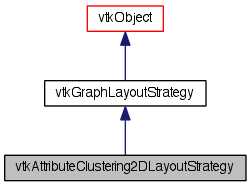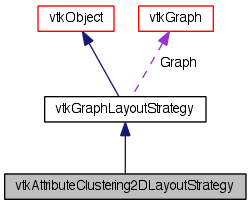a simple fast 2D graph layout More...
#include <vtkAttributeClustering2DLayoutStrategy.h>


Detailed Description
a simple fast 2D graph layout
This class is a density grid based force directed layout strategy. Also please note that 'fast' is relative to quite slow. :) The layout running time is O(V+E) with an extremely high constant.
- Thanks:
- Thanks to Godzilla for not eating my computer so that this class could be written.
- Events:
- vtkCommand::ProgressEvent
Definition at line 48 of file vtkAttributeClustering2DLayoutStrategy.h.
Member Typedef Documentation
Reimplemented from vtkGraphLayoutStrategy.
Definition at line 53 of file vtkAttributeClustering2DLayoutStrategy.h.
Constructor & Destructor Documentation
Member Function Documentation
| static vtkAttributeClustering2DLayoutStrategy* vtkAttributeClustering2DLayoutStrategy::New | ( | ) | [static] |
Create an object with Debug turned off, modified time initialized to zero, and reference counting on.
Reimplemented from vtkObject.
| static int vtkAttributeClustering2DLayoutStrategy::IsTypeOf | ( | const char * | name | ) | [static] |
Return 1 if this class type is the same type of (or a subclass of) the named class. Returns 0 otherwise. This method works in combination with vtkTypeMacro found in vtkSetGet.h.
Reimplemented from vtkGraphLayoutStrategy.
| virtual int vtkAttributeClustering2DLayoutStrategy::IsA | ( | const char * | name | ) | [virtual] |
Return 1 if this class is the same type of (or a subclass of) the named class. Returns 0 otherwise. This method works in combination with vtkTypeMacro found in vtkSetGet.h.
Reimplemented from vtkGraphLayoutStrategy.
| static vtkAttributeClustering2DLayoutStrategy* vtkAttributeClustering2DLayoutStrategy::SafeDownCast | ( | vtkObjectBase * | o | ) | [static] |
Reimplemented from vtkGraphLayoutStrategy.
| virtual vtkObjectBase* vtkAttributeClustering2DLayoutStrategy::NewInstanceInternal | ( | ) | const [protected, virtual] |
Reimplemented from vtkGraphLayoutStrategy.
| vtkAttributeClustering2DLayoutStrategy* vtkAttributeClustering2DLayoutStrategy::NewInstance | ( | ) | const |
Reimplemented from vtkGraphLayoutStrategy.
| void vtkAttributeClustering2DLayoutStrategy::PrintSelf | ( | ostream & | os, |
| vtkIndent | indent | ||
| ) | [virtual] |
Methods invoked by print to print information about the object including superclasses. Typically not called by the user (use Print() instead) but used in the hierarchical print process to combine the output of several classes.
Reimplemented from vtkGraphLayoutStrategy.
| virtual char* vtkAttributeClustering2DLayoutStrategy::GetVertexAttribute | ( | ) | [virtual] |
The name of the array on the vertices, whose values will be used for determining clusters.
| void vtkAttributeClustering2DLayoutStrategy::SetVertexAttribute | ( | const char * | ) |
The name of the array on the vertices, whose values will be used for determining clusters.
| virtual void vtkAttributeClustering2DLayoutStrategy::SetRandomSeed | ( | int | ) | [virtual] |
Seed the random number generator used to jitter point positions. This has a significant effect on their final positions when the layout is complete.
| virtual int vtkAttributeClustering2DLayoutStrategy::GetRandomSeed | ( | ) | [virtual] |
Seed the random number generator used to jitter point positions. This has a significant effect on their final positions when the layout is complete.
| virtual void vtkAttributeClustering2DLayoutStrategy::SetMaxNumberOfIterations | ( | int | ) | [virtual] |
Set/Get the maximum number of iterations to be used. The higher this number, the more iterations through the algorithm is possible, and thus, the more the graph gets modified. The default is '100' for no particular reason Note: The strong recommendation is that you do not change this parameter. :)
| virtual int vtkAttributeClustering2DLayoutStrategy::GetMaxNumberOfIterations | ( | ) | [virtual] |
Set/Get the maximum number of iterations to be used. The higher this number, the more iterations through the algorithm is possible, and thus, the more the graph gets modified. The default is '100' for no particular reason Note: The strong recommendation is that you do not change this parameter. :)
| virtual void vtkAttributeClustering2DLayoutStrategy::SetIterationsPerLayout | ( | int | ) | [virtual] |
Set/Get the number of iterations per layout. The only use for this ivar is for the application to do visualizations of the layout before it's complete. The default is '100' to match the default 'MaxNumberOfIterations' Note: Changing this parameter is just fine :)
| virtual int vtkAttributeClustering2DLayoutStrategy::GetIterationsPerLayout | ( | ) | [virtual] |
Set/Get the number of iterations per layout. The only use for this ivar is for the application to do visualizations of the layout before it's complete. The default is '100' to match the default 'MaxNumberOfIterations' Note: Changing this parameter is just fine :)
| virtual void vtkAttributeClustering2DLayoutStrategy::SetInitialTemperature | ( | float | ) | [virtual] |
Set the initial temperature. The temperature default is '5' for no particular reason Note: The strong recommendation is that you do not change this parameter. :)
| virtual float vtkAttributeClustering2DLayoutStrategy::GetInitialTemperature | ( | ) | [virtual] |
Set the initial temperature. The temperature default is '5' for no particular reason Note: The strong recommendation is that you do not change this parameter. :)
| virtual void vtkAttributeClustering2DLayoutStrategy::SetCoolDownRate | ( | double | ) | [virtual] |
Set/Get the Cool-down rate. The higher this number is, the longer it will take to "cool-down", and thus, the more the graph will be modified. The default is '10' for no particular reason. Note: The strong recommendation is that you do not change this parameter. :)
| virtual double vtkAttributeClustering2DLayoutStrategy::GetCoolDownRate | ( | ) | [virtual] |
Set/Get the Cool-down rate. The higher this number is, the longer it will take to "cool-down", and thus, the more the graph will be modified. The default is '10' for no particular reason. Note: The strong recommendation is that you do not change this parameter. :)
| virtual void vtkAttributeClustering2DLayoutStrategy::SetRestDistance | ( | float | ) | [virtual] |
Manually set the resting distance. Otherwise the distance is computed automatically.
| virtual float vtkAttributeClustering2DLayoutStrategy::GetRestDistance | ( | ) | [virtual] |
Manually set the resting distance. Otherwise the distance is computed automatically.
| virtual void vtkAttributeClustering2DLayoutStrategy::Initialize | ( | ) | [virtual] |
This strategy sets up some data structures for faster processing of each Layout() call
Reimplemented from vtkGraphLayoutStrategy.
| virtual void vtkAttributeClustering2DLayoutStrategy::Layout | ( | ) | [virtual] |
This is the layout method where the graph that was set in SetGraph() is laid out. The method can either entirely layout the graph or iteratively lay out the graph. If you have an iterative layout please implement the IsLayoutComplete() method.
Implements vtkGraphLayoutStrategy.
| virtual int vtkAttributeClustering2DLayoutStrategy::IsLayoutComplete | ( | ) | [inline, virtual] |
I'm an iterative layout so this method lets the caller know if I'm done laying out the graph
Reimplemented from vtkGraphLayoutStrategy.
Definition at line 126 of file vtkAttributeClustering2DLayoutStrategy.h.
Member Data Documentation
Definition at line 132 of file vtkAttributeClustering2DLayoutStrategy.h.
Definition at line 133 of file vtkAttributeClustering2DLayoutStrategy.h.
Definition at line 134 of file vtkAttributeClustering2DLayoutStrategy.h.
The documentation for this class was generated from the following file:
- dox/Infovis/Layout/vtkAttributeClustering2DLayoutStrategy.h
 1.8.0
1.8.0